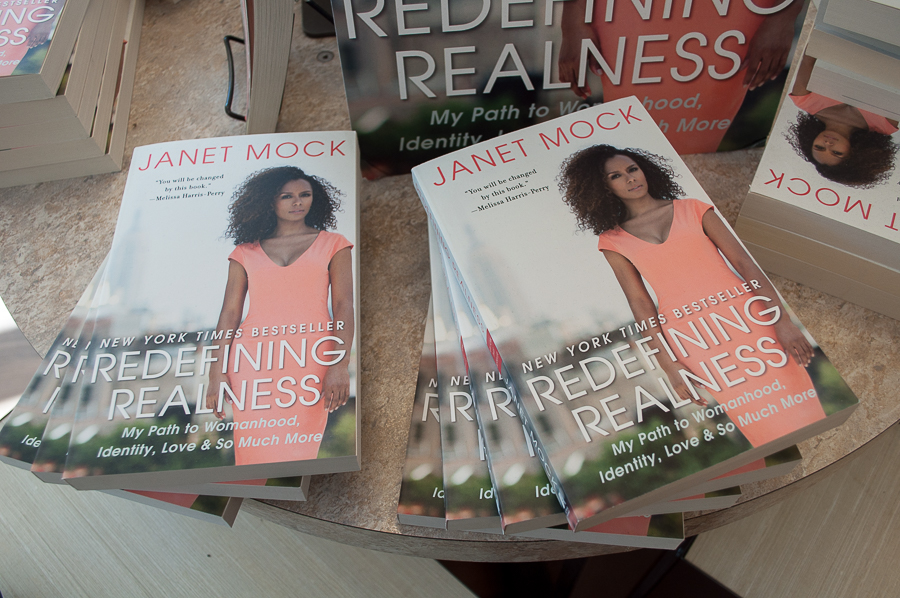
Several events planned around book, including Oct. 4 transgender rights talk
Janet Mock’s New York Times bestseller “Redefining Realness: My Path to Womanhood, Identity, Love and So Much More” has been chosen for UC Davis’ 15th Campus Community Book Project. Campus workshops, conferences, film screenings, lectures and Q&As have been curated around Mock’s book, which addresses the intersection of LGBTQIA and racial identities.
Mock is a well-known transgender activist, writer and reporter. On Feb. 5, 2018, Mock will come to the Mondavi Center for a panel discussion and book signing.
Mikael Villalobos, the associate chief diversity officer in the Office of Campus Community Relations, provided insight into how he and other committee members chose Mock’s book. Villalobos, who chaired the book project and directed the program, said the committee, which is “made of faculty, students and staff,” selects the book based on a chosen topic.
“More than 40 books were looked at,” Villalobos said. “The committee was focused on ensuring that the book […] chosen really addressed the intersection of race [and] gender identity. Janet Mock’s book [is an] intersection between racial [identity], ethnic identity and LGBTQIA identity.”
When asked about his thoughts on the coordinated events accompanying “Redefining Realness,” Villalobos explained how impactful the events are in promoting the book.
“We do our best to make sure the events that support the featured book will be diverse,” Villalobos said. “We wanted the events to explore the themes from the book, like gender identity. It’ll include how laws and policies impact members of a particular group and […] explore [opportunities] to bring awareness in terms of how folks may experience the society by virtue of their identities. We made sure the program would include research, services and programs that very much deal with the topic that was the impetus for Janet Mock’s book.”
Villalobos said UC Davis plays a role in developing LGBTQIA rights and advocacy as well as in ensuring the safety of individuals within the community.
“As an administrator, I think the book project serves as a jumping-off point to build awareness of knowledge for folks who may not be familiar with what it means to identify with [the] LGBTQIA community,” Villalobos said.
One event that covered court proceedings for transgender discrimination was given by Brian Soucek, a King Hall acting professor and a Martin Luther King Jr. Hall Research Scholar. On Oct. 4, he delivered an hour-long lecture titled “Trans Rights and Fights in the Time of Trump“ to kick off the lecture series. Soucek’s lecture covered individual cases and gave a history of gender anti-discrimination laws in the United States, focusing on laws like Title IX.
Soucek pointed out how most UC Davis students are of an age where they “haven’t navigated race-segregated bathrooms or locker rooms” yet have become inundated with sex-segregated ones.
“When you have a transgender woman, should she be allowed to use the women’s restroom?” Soucek said. “School districts, government [and] private organizations have said ‘no’ — that gender is determined by biology. Especially if they have anatomical features associated with a man. Sometimes, a special occupancy bathroom will be offered.”
Soucek talked about a specific case where 15-year-old Gavin Grimm, a transgender boy, was offered the option of his nurse’s bathroom at his public high school.
“Grimm rejected the accommodation to go to the nurse’s bathroom,” Soucek said. “His case said that he should be able to use male locker rooms and bathrooms in his school. The process has been long and arduous.”
Soucek explained how the Obama administration sent out a letter to U.S. courts and public schools explicitly allowing transgender students to use facilities consistent with their identities. However, the Trump administration withdrew this position and left nothing as a replacement, providing reason for the Supreme Court to send the case back to trial courts.
With student cases centered around using public restrooms, Soucek contested that “it’s never just bathrooms” but also about “navigating public spaces.”
Soucek provided examples of defenses that U.S. judicial courts will historically accept which legitimize gender discrimination. Soucek said that while processes dealing with gender discrimination cases are a legal quagmire, the Supreme Court has tried to tackle its understanding of gender identity.
“To the courts, things must first be compared to race and, second, compared to religion to make them understand identity,” Soucek said. ”What the trans plaintiffs have asked, under the constitution, [is] that gender identity get at least intermediate scrutiny in court.”
The sliding, non-binary scale of gender identity is still not recognized by courts and judges; Soucek said that this leads to a concern that courts will apply an understanding of gender as a spectrum for some but not all trans people.
Soucek talked about how he has learned that students in 2017 want to see the legal system fully legitimize gender fluidity. Currently, Soucek said the “law sides with the Janet Mocks rather than the genderfluid.”
Upcoming events structured around the Campus Community Book Project include “Trans Students Speak” on Oct. 19, a film screening of “Major!” — a documentary about a transgender activist — on Oct. 27 and a Nov. 8 discussion of “Redefining Realness.” More information about scheduled upcoming events can be found on the Campus Community Book Project website.
Written by: Aaron Liss — campus@theaggie.org




